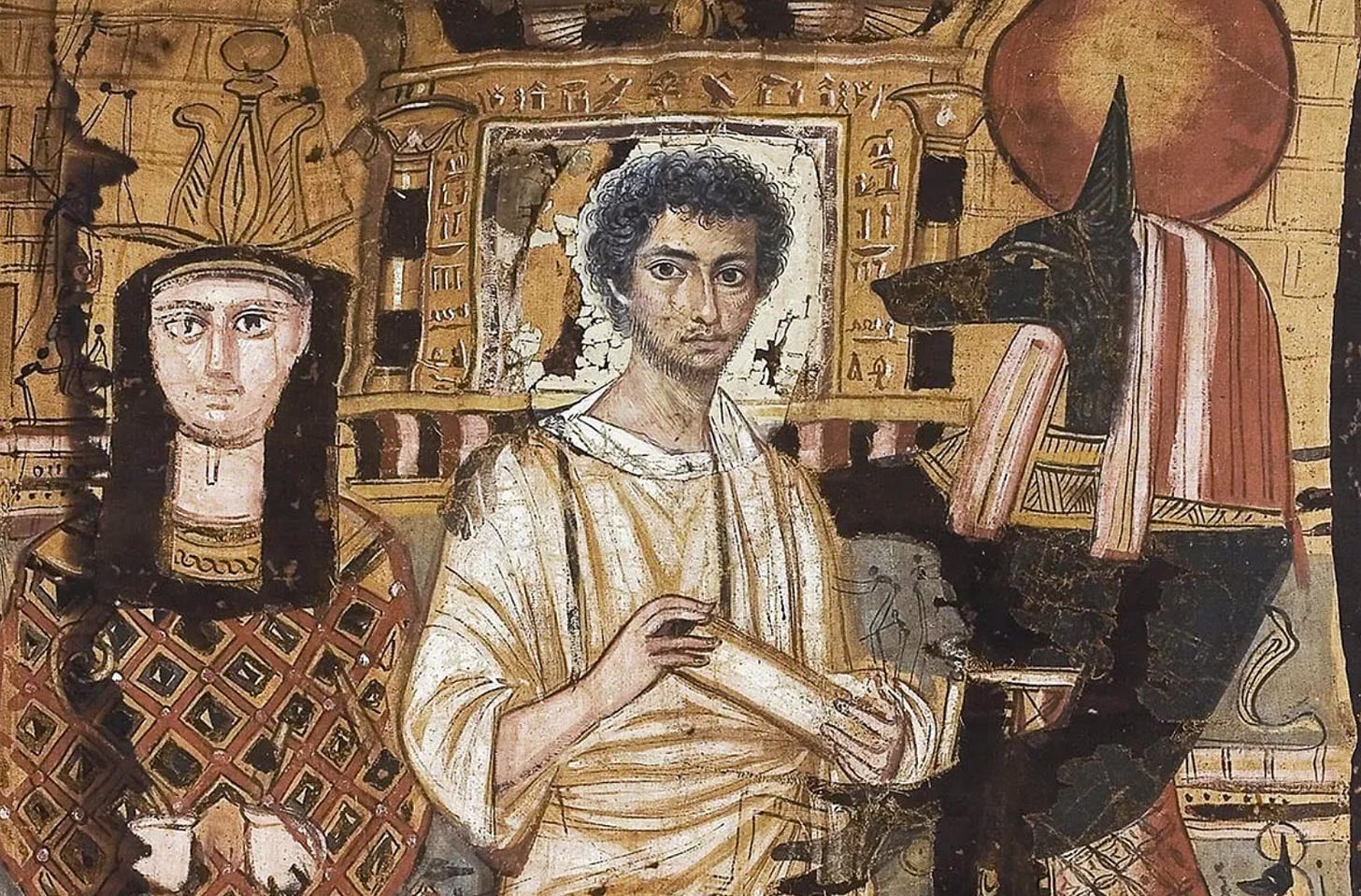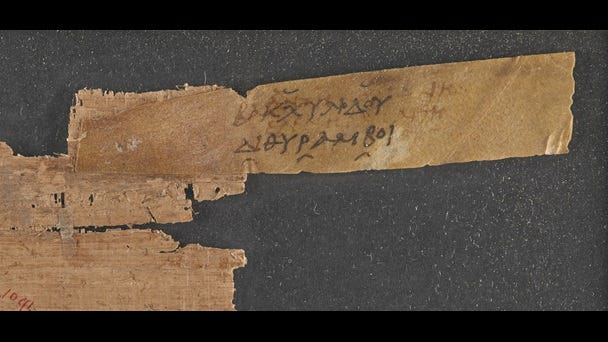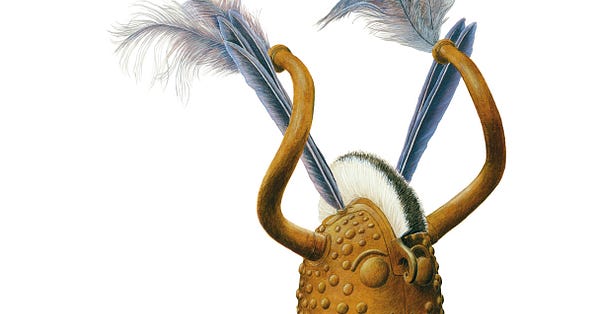
This week, we head back to school with advice from Ancient MakerSpaces on using technology to enhance equity and access. Then, we spotlight new scholarship on ancient climatology and Vesuvius, myths surrounding Viking helmets, upcoming conferences on Byzantine medicine and injustice in the study of antiquity, and more.
Best Digital Practices for the Pandemic—Two Years On (Nandini Pandey)
At the recent 2022 SCS Annual Meeting, the Ancient MakerSpaces planning committee – spearheaded by Aaron Hershkowitz – convened a panel to discuss “how the pandemic and the shift to digital venues has affected pedagogy, research, and interactions with ancient culture in terms of equity, accessibility, and identity." The panel included experts, practitioners, and activists in a wide range of fields: Clara Bosak-Schroeder (University of Illinois), Flint Dibble (Cardiff University), Francesca Giannetti (Rutgers University), Nadhira Hill (University of Michigan), and Kaitlin Moleen (West Essex Regional High School). Moderator Nandini Pandey (Johns Hopkins) asked all participants what technologies or practices they’d keep, drop, and change after the pandemic.
Notwithstanding the diversity of perspectives represented, clear common themes and best practices emerged. Panelists underlined the gains in equity and access that result from giving our students and collaborators multiple options and modalities for participating, e.g. chat and asynchronous discussion boards in addition to live video. Teachers found that the trend toward ‘un-grading’ or ‘un-homework’ reduced student anxiety while producing better learning outcomes, particularly among people disprivileged by traditional evaluation structures.
Technology was also a theme. During this isolating pandemic, many panelists invested in creating community using Discord or Wiki collaborations. Participants also advocated for better recognition and crediting of the often under-acknowledged collective labor that goes into syllabi, course design, and teaching materials (especially for long-running courses that pass from instructor to instructor). The term “tolerable suboptimization” has been used recently to describe the inequitable consequences of the underfunding of public universities.
Some panelists took back this term to point to the labor inequities that sustained teaching and research during the pandemic and that fell disproportionately on the academic precariat. They highlighted the need for contingent faculty and graduate students – if not to “do a bad job of putting [their] courses online” – at least to protect their time and practice care for themselves and their students, rather than strive toward the impossible and even undesirable goal of rendering their online classes identical to fully in-person learning experiences.
For more on these ideas and many more, registrants for the 2022 AIA-SCS annual meeting can until February 13, 2022 view a recording of this panel and others that touched on equity and access in pandemic-era pedagogy, e.g. “Bodies in Chairs” organized by Irene Salvo. The renewed interest in pedagogy, and the lively interdisciplinary conversations that surrounded it during this conference, is one more good we hope will outlast the pandemic.
Some useful resources …
… on protecting your time and communicating more effectively:
Newport, Cal. 2021. A World Without Email: Reimagining Work in an Age of Communication Overload. Penguin.
http://five.sentenc.es (a signature file to accompany shorter emails)
Stillman, Jessica. 2022. “20 Templates to Say No to Just About Everything (Nicely) So You Can Get Your Focus Back.” Inc.
… on using Discord as a base for teaching:


… on digital editing and teaching:
Beshero-Bondar, Elisa E. 2018. “Digital Mitford: Workshop Materials.”
Birnbaum, David J. 2018. “Digital Humanities Course Materials.”
… the name says it all:
Hamilton, Laura T. and Kelly Nielsen. 2021. Broke: The Racial Consequences of Underfunding Public Universities. Chicago.

Public Scholarship on the Internet
A new #OA article in Praehistorische Zeitschrift by Helle Vandkilde, Valentina Matta, Laura Ahlqvist, and Heide W. Nørgaard focuses on “Anthropomorphised warlike beings with horned helmets: Bronze Age Scandinavia, Sardinia, and Iberia compared.” In remarks to LiveScience, Vandkilde notes the inaccurate myths surrounding these helmets, "For many years in popular culture, people associated the Viksø helmets with the Vikings…But actually, it's nonsense. The horned theme is from the Bronze Age and is traceable back to the ancient Near East."


There is a new open access article published in Climate of the Past, “No evidence for tephra in Greenland from the historic eruption of Vesuvius in 79 CE: implications for geochronology and paleoclimatology,” authored by Gill Plunkett, Michael Sigl, and a number of other researchers. It changes a lot of the assertions about the use of volcanic ash (called tephra) in the ice strata of Greenland [the data set is here].
Here we report the investigation of ash particles in a Greenland ice core that are associated with a volcanic sulfuric acid layer previously attributed to the 79 CE eruption of Vesuvius. Major and trace element composition of the particles indicates that the tephra does not derive from Vesuvius but most likely originates from an unidentified eruption in the Aleutian arc…our findings further challenge the previous assignation of this volcanic event to 79 CE.

At Ancient Jew Review, there are four new articles tied to the Tracing Christians in Global Late Antiquity conference in 2021. First, Sarah Porter discusses the roundtable on “Method, Ethics, and Historiography in the Study of Late Antique Christianity,” then Alexandra Leewon Schultz looks at the narrative of western loss surrounding ancient libraries:
For a couple years now I’ve been collecting references to the Library of Alexandria, and you would not believe how widespread it is across movies, videogames, internet memes, and so forth. This is not an innocent fantasy about a universal library and democratizing knowledge. People are very attuned to the fact that it’s a Greek library and wedded to the myth that the Greeks were a superior civilization, so you see it repeated over and over that the library’s destruction set “civilization” (i.e. white, European civilization) back by a thousand years. And beyond the pop culture references, there are all these digital humanities projects now (many named after Alexandria) to collect and store data, build universal libraries, and forestall a digital dark age. What I want to drive home is that these are the ideas our disciplines promote.
David Maldonado Rivera looks at the colonial histories of the Caribbean and asks: “Who owns the properties claimed by the church, municipalities, and other entities?” Finally, Annette Yoshiko Reed looks at how we approach tracing early Christians altogether. Rather than focusing on Rome and looking outwards, we need to examine “perspectives of Syria and Ethiopia, while also gazing anew onto Christians as they appear to Jews and others too, with purviews onto different ways of difference-making as well.”


Upcoming Lectures, Conferences, and Events
The first Cambridge Byzantine Worlds Seminar of the year will be this Friday, January 28, 2022 at 5 pm UK Time via Zoom. Come and find out about magic and medicine in Byzantium in the first talk, by Isabel Grimm-Stadelmann. Register here.


Over at the University of Minnesota, a series of discussions will be held via the Department of Classical and Near Eastern Religions and Cultures called, "The Future of the Past: Rethinking Legacies of Injustice in the Study of Antiquity." The first session is on manuscript studies and is being held on February 18th from 1:00-2:30 pm CT. The discussions, which are meant to invite conversation on various issues, will be held on Zoom for at least the first two sessions, before becoming hybrid thereafter. For more information, please email department chair Steve Ahearne-Kroll (sahearne@umn.edu).
New Online Journal Issues curated by @YaleClassicsLib
Les Nouvelles de l’archéologie No. 163 (2021) #openaccess
Journal of the Warburg and Courtauld Institutes Vol. 84 (2021)
Acta Archaeologica Lodziensia Vol. 67 (2021) #openaccess
Atlantís - review Vol. 43 (2022) #openaccess
Apeiron Vol. 55, No. 1 (2022) NB: Evan Rodriguez “A Long Lost Relative in the Parmenides? Plato’s Family of Hypothetical Methods”
Journal of Latin Linguistics Vol. 20, No. 2 (2021) NB: Alessandro Buccheri, et. al. “Semantic analysis and frequency effects of conceptual metaphors of emotions in Latin.” Introduces Lexicon Translaticium Latinum
Catholic Biblical Quarterly Vol. 84, No.1 (2022)
Early Medieval Europe Vol 30, No. 1 (2022)
Journal for the Study of Judaism Vol. 53, No. 1 (2022)
Les Mélanges de l’École française de Rome Antiquité Vol. 133, No. 2 (2021) #openaccess Picta: Savoirs, contacts et interconnaissance dans la péninsule italienne (Ve-IIe s. av. n. è.)
The Journal of Ecclesiastical History Vol. 73, No. 1 (2022)
Bulletin de la Société d'égyptologie, Genève No. 32 (2021)
Pitches
The Public Books section "Antiquities" continues to take pitches for articles to be published in 2022. You can pitch to our “Pasts Imperfect” column at the LA Review of Books using this form and to the new JSTOR column here. Thanks for reading!






